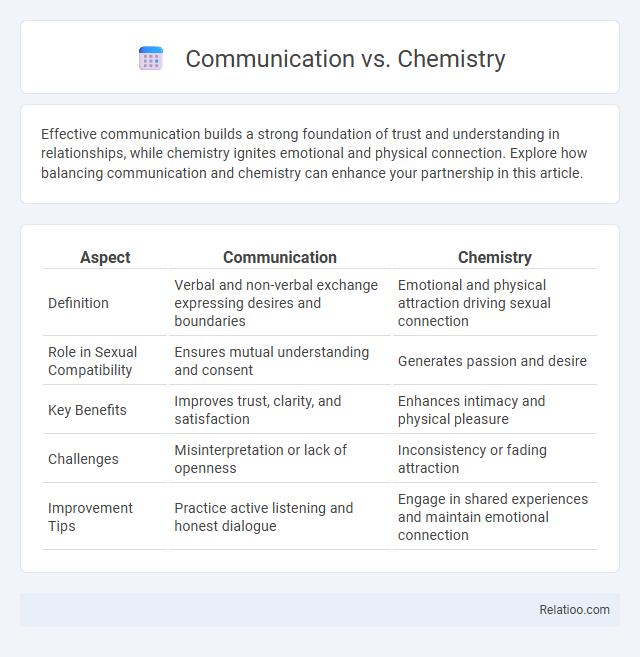Effective communication builds a strong foundation of trust and understanding in relationships, while chemistry ignites emotional and physical connection. Explore how balancing communication and chemistry can enhance your partnership in this article.
Table of Comparison
| Aspect | Communication | Chemistry |
|---|---|---|
| Definition | Verbal and non-verbal exchange expressing desires and boundaries | Emotional and physical attraction driving sexual connection |
| Role in Sexual Compatibility | Ensures mutual understanding and consent | Generates passion and desire |
| Key Benefits | Improves trust, clarity, and satisfaction | Enhances intimacy and physical pleasure |
| Challenges | Misinterpretation or lack of openness | Inconsistency or fading attraction |
| Improvement Tips | Practice active listening and honest dialogue | Engage in shared experiences and maintain emotional connection |
Understanding Communication in Relationships
Understanding communication in relationships involves recognizing how verbal and nonverbal expressions foster emotional connection and clarity between partners. Chemistry refers to the innate spark and physical attraction that enhances intimacy, while intimate conversation deepens trust by enabling vulnerability and emotional sharing. Effective communication bridges chemistry and intimacy, ensuring mutual understanding and stronger relational bonds.
The Science Behind Chemistry
The science behind chemistry in relationships involves the release of neurotransmitters such as dopamine, oxytocin, and serotonin, which create feelings of pleasure, bonding, and attachment. While communication relies on language and cognitive processing to exchange information effectively, chemistry is rooted in biological and hormonal reactions that foster emotional connection. Intimate conversations further enhance these chemical responses by increasing vulnerability and trust, strengthening the overall bond between partners.
Key Differences Between Communication and Chemistry
Communication involves the exchange of information through verbal and non-verbal means, establishing clarity and understanding between individuals. Chemistry refers to the natural, often subconscious emotional and physical connection that creates attraction and rapport beyond words. Your intimate conversations blend these elements, fostering deeper bonds by combining clear expression with underlying emotional resonance.
Why Communication Matters for Long-Term Success
Effective communication establishes trust and clarity, which are essential foundations for long-term relationship success. While chemistry creates initial attraction and intimate conversations deepen emotional bonds, communication ensures ongoing understanding and conflict resolution. Consistent dialogue helps partners navigate challenges, align goals, and sustain connection over time.
The Role of Chemistry in Initial Attraction
Chemistry plays a crucial role in initial attraction by triggering subconscious emotional and physical responses that draw individuals together, often before meaningful communication occurs. While communication helps build understanding and connection, the spark of chemistry can create an immediate sense of compatibility and desire. Your ability to recognize and nurture this chemistry can significantly influence the development of deeper intimate conversations and lasting relationships.
Can Good Communication Replace Chemistry?
Good communication strengthens understanding and emotional connection but cannot fully replace chemistry, which involves spontaneous physical attraction and emotional resonance beyond words. While intimate conversations deepen trust and reveal vulnerabilities, chemistry triggers an unspoken bond that fosters passion and desire. Together, communication, chemistry, and intimate conversation build a comprehensive relationship foundation that balances rational interaction with emotional and physical synergy.
Signs of Strong Chemistry vs Effective Communication
Signs of strong chemistry include effortless connection, mutual attraction, and a natural flow of emotions, often creating an intense emotional or physical bond. Effective communication, however, relies on clarity, active listening, and the ability to express thoughts and feelings openly, fostering understanding and trust. While chemistry ignites passion and connection, communication sustains relationship growth and resolves conflicts through meaningful dialogue.
Building Communication Skills With Your Partner
Building communication skills with your partner enhances emotional intimacy and strengthens the foundation of your relationship. Effective communication fosters understanding by allowing both partners to express feelings, needs, and boundaries clearly, which fuels both chemistry and intimate conversations. Prioritizing active listening and honest dialogue creates a safe space where deeper connections and genuine chemistry can flourish naturally.
Balancing Emotional Chemistry and Rational Dialogue
Balancing emotional chemistry and rational dialogue requires understanding the unique roles each plays in your relationships. Emotional chemistry fuels passion and connection, while rational dialogue ensures clarity and mutual understanding. Cultivating both helps you navigate conflicts seamlessly and deepen intimacy through meaningful conversations.
Navigating Relationships When One Is Missing
Effective communication forms the foundation of healthy relationships, enabling partners to express needs and resolve conflicts. Chemistry creates the emotional and physical attraction that fosters connection and passion. When intimate conversation is lacking, even strong chemistry and good communication may fail to deepen the bond, making it essential to prioritize open, vulnerable dialogue to maintain relationship satisfaction.

Infographic: Communication vs Chemistry
 relatioo.com
relatioo.com